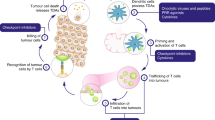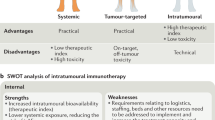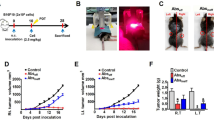Abstract
The generation of strong tumor-specific immunity by in situ gene therapy is an attractive approach for the eradication of human cancer lesions. The objectives of this study were to examine the toxicities of employing the human HLA-A2, HLA-B13 and the murine H-2Kk genes to generate tumor regression in patients with different cancer types via DC-Chol/DOPE cationic liposomes. The study was composed of two phaseI/II trials involving a total of 19 late-stage cancer patients. The patients were given four weekly injections of a DNA–liposome mixture directly into a cutaneous nodule. These procedures resulted in no significant clinical side-effects. The HLA-A2 gene gave the highest level of expression in situ. Although all patients treated had progressive systemic disease and eventually succumbed to their disease, strong local responses were generated in the treated nodules. Of the eight patients whose cutaneous nodules received HLA-A2 DNA, two completely regressed while four tumor nodules gave a partial local response. All but one of the patients who received HLA-A2–liposome mixtures and had a subsequent local response were either cervical or ovarian carcinoma patients. This local response, seen in a group of patients who had relapsed stage IV systemic metastatic disease and were refractory to all available therapies, demonstrates the generation of a strong local immune response following our in situ gene therapy protocol. Further studies to investigate the use of HLA-A2 DC-Chol/DOPE cationic liposomes for immunotherapy of cervical and ovarian cancers are warranted.
This is a preview of subscription content, access via your institution
Access options
Subscribe to this journal
Receive 12 print issues and online access
$259.00 per year
only $21.58 per issue
Buy this article
- Purchase on Springer Link
- Instant access to full article PDF
Prices may be subject to local taxes which are calculated during checkout
Similar content being viewed by others
Author information
Authors and Affiliations
Rights and permissions
About this article
Cite this article
Hui, K., Ang, P., Huang, L. et al. Phase I study of immunotherapy of cutaneous metastases of human carcinoma using allogeneic and xenogeneic MHC DNA–liposome complexes. Gene Ther 4, 783–790 (1997). https://doi.org/10.1038/sj.gt.3300455
Received:
Accepted:
Issue Date:
DOI: https://doi.org/10.1038/sj.gt.3300455
Keywords
This article is cited by
-
Research Progress of nucleic acid delivery vectors for gene therapy
Biomedical Microdevices (2020)
-
Interleukin‐10 Gene Transfer: Prevention of Multiple Organ Injury in a Murine Cecal Ligation and Puncture Model of Sepsis
World Journal of Surgery (2007)
-
Synthesis of a novel series of cationic lipids that can act as efficient gene delivery vehicles through systematic heterocyclic substitution of cholesterol derivatives
Gene Therapy (2001)
-
Cationic amphiphiles of both lipid and nonlipid nature in gene therapy
Russian Chemical Bulletin (2000)



